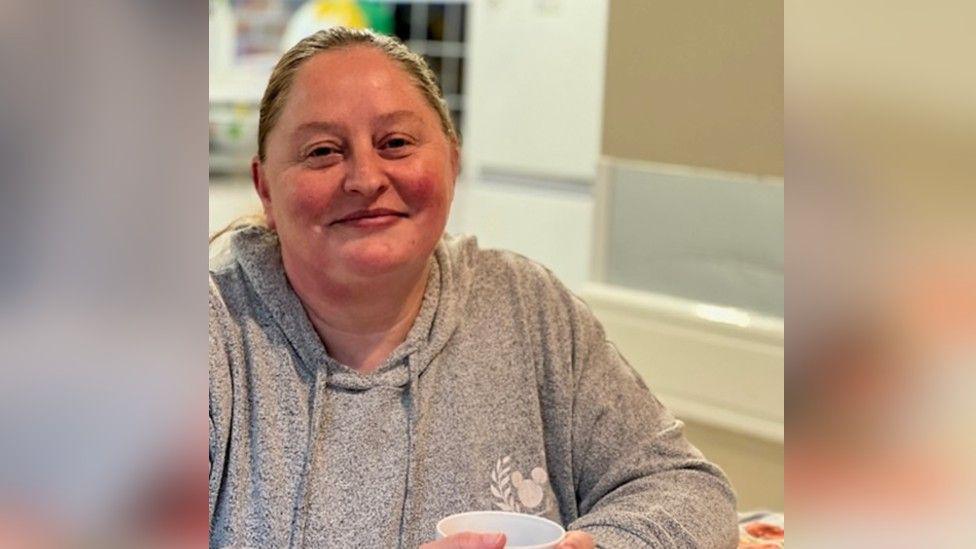Social care sector ‘will struggle’ to cover costs

Charity chief executive Jim Kane said the changes come after real-term cuts
- Published
One of the country’s biggest adult social care providers has said the government’s Budget changes could see some providers forced to hand back contracts.
The Widnes-based charity, Community Integrated Care, said increases in national insurance contributions and the minimum wage will cost the sector millions of pounds and that ultimately those who suffer would be among the most vulnerable in society.
With more than 6,000 employees, Community Integrated Care estimated the changes will cost them around £12m and that smaller providers would struggle.
The Department for Health and Social Care said it had allocated more than £600m of new funding for social care, which is part of a wider package “to bolster support for councils”.

Home resident Tauseef takes part in charity activities like swimming and football.
BBC North West Tonight went to one of the charity’s homes in Stockport to talk to staff and residents.
Tauseef, who has been living there for four and a half years, takes part in a range of sports and activities that the charity helps to provide for him.
“I like football, cricket, swimming,…. going places like bowling and sometimes in the summer doing gardening,” he said.
Tauseef lives in supported accommodation with five other adults, all with some degree of learning disability or autism or complex care needs.
The residents are helped by a team of dedicated care workers like Chantel Ramdeal, who has done this job for more than 20 years.
“I love seeing all of [the residents] learning new things, new skills,” she said.
“I go home with a great satisfaction that I’ve been a part of that to support them with that.”
The charity is dependent for funding on what the council will pay for each resident, and councils themselves have seen huge budget cuts over the past 14 years.
Community Integrated Care pays above the minimum wage, but Chantel said some colleagues had left for better paid jobs in the NHS or retail.
“Sometimes people can fall on hardship if a car breaks down or something like that.
“You end up having to put more hours in to end up with a decent wage and then that ends up putting a strain on your own family life,” she said.
The new Budget, which comes into effect next April will see the minimum wage rise by 6.7% to £12.21 an hour, a change which will improve pay for many care workers.

Care worker Chantel Ramdeal has worked in the sector for twenty years
It will also increase National Insurance contributions for employers from 13.8% to 15%, and lower the annual salary at which it must be paid from £9,100 to £5,000.
While the National Insurance employer contributions will be welcome news for many support workers, the combination of the changes is likely to have a significant impact on the care sector.
That is because workers are often low paid and many work part time, earning less than the current £9,100 cut off point (which means their employers don’t have to pay national insurance) but more than the new threshold of £5,000.
Chief Executive Officer Jim Kane said the latest changes came on top of years of real-term cuts.
“We’ve seen a deficit over the past few years.
"Part of that is planned – we wanted to invest in pay for all of our colleagues, but a lot of it is just because we are generally underfunded,” he said.
This financial year they were on course to make a small surplus, which he said they were going to invest in improvements to the service, but he now feared that they would begin the new financial year with another loss.
“Across the sector there’s a lot of worry. We’re a large charity, we have the benefit of being reasonably resilient, but worst-case scenario, services will become uneconomic to run,” he said.
He stressed that while their charity was not at risk, other smaller providers were having to start thinking about the future.
“Lots of providers are raising flags that this is an existential crisis for them. I think they see that if they can’t start to have really honest conversations with their commissioners and recover these costs, they don’t have the reserves to continue,” he said.
Those commissioners are generally the local councils, and the government has already announced that it is handing them an extra £600 million for adult and child social care.
But some analysts say that is nowhere near enough to pay for the increased costs of charities like this and a rise in demand for their services.
'Have the conversation'
Mr Kane pointed out that the impact of contracts being handed back by social care firms would fall hardest on the vulnerable adults using the service, who may have to move to other homes.
“People who rely on their care teams who they may have known for years, even decades, run the risk of losing their home, moving to a different provider.
“If it’s a really complex service they might have to move miles away from their home, where their loved ones are. So really major disruption to people’s lives which can often set them back in their journey to gain as much independence as possible.”
He said he wanted to see a debate in government on how to properly fund specialist social care.
“That might be by changing things through the spending review, it might be by giving social care providers dispensations against national insurance.
"I’m not really sure what the answer is, but the first step is to have the conversation and for too long politicians have shied away from having that conversation."
A Department of Health and Social Care spokesperson said it was “determined to tackle the significant challenges and build a national care service so everybody can access the high-quality care they deserve.
As well as establishing a fair pay agreement for care professionals, and increasing the carer’s allowance earnings threshold, it said it was allocating “at least £600m of new funding for social care and £86m for the disabled facilities grant, which are part of a wider package to bolster support for councils”.
Listen to the best of BBC Radio Manchester on Sounds and follow BBC Manchester on Facebook, external, X, external, and Instagram, external. You can also send story ideas to northwest.newsonline@bbc.co.uk, external and via Whatsapp to 0808 100 2230.
Related topics
More like this story
- Published30 October 2024

- Published17 November 2024
